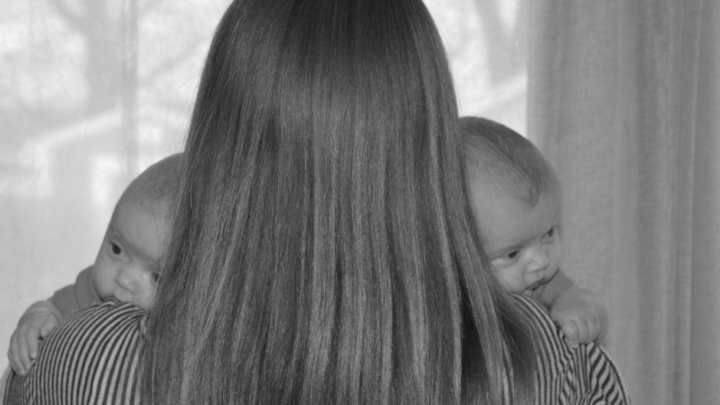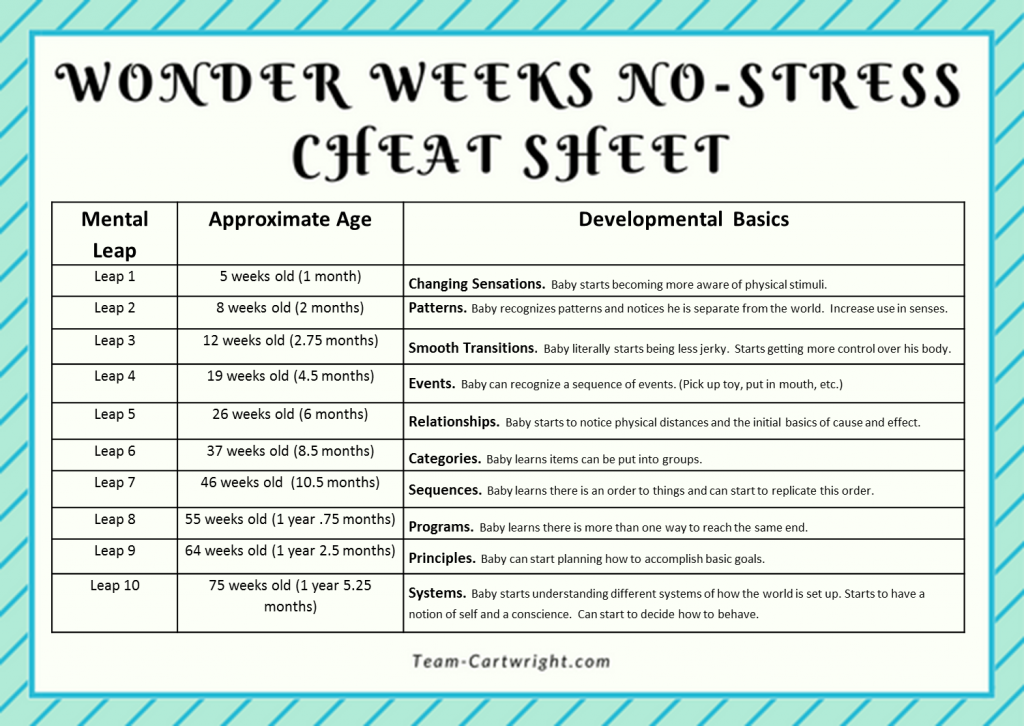

I remember discovering the Wonder Weeks when Ben was a baby. I was, of course, googling everything I could on how to raise a baby- how to get them to sleep, how to form a schedule, what to do with them while they were awake.
Specifically, I was curious about how babies learn and perceive the world around them. I, like most people with babies, found this sort of development fascinating and wanted to use this information to help my baby.
I was at first thrilled to find a reference that outlined specific leaps my baby would make and told me what they were experiencing. I read a bit more and found graphics which visually showed me what to expect from my child. The thing is, there were a lot of ‘stormy periods’ on these charts. Like a whole lot.
Like my child’s first year of life was going to be one long fuss fest. I was not excited about that.
What's In This Post?
History of the Wonder Weeks
Let’s back up a moment. What are the Wonder Weeks? Simply stated these are times in your baby’s life in which they are making huge strides in mental development.
Dr. Plooij developed the book. He began his career studying chimpanzee mothers and babies. After spending time cataloging behavior he found that the babies tended to follow a similar pattern of development, marked by sudden clingy behavior – regression – and then more independence – development.
Later Dr. Plooij started looking at these patterns in human mothers and babies. He found a pattern of ten distinct times mental leaps were made. He was able to use his data to find a timeline that many babies follow in this development, which became the wonder weeks. (reference)
My Experience with Wonder Weeks
Back to my experience with them. I started following the weeks and saw when my son was supposed to be fussy. Sure enough, if I saw that he was supposed to be cranky I saw all sorts of cranky behavior.
Then there were times when I looked at the chart and saw that he was supposed to be happy and he still had fussy times. This was very depressing to me. If he was crying during a ‘sunny period’ how bad would it get during the stormy periods?
At one point I stopped looking at the weeks as obsessively and noticed a drop in fussy behavior. After a particularly sunny time, I looked at the charts again and saw my son had supposedly just gone through a very rough period. This was not what I observed.
I started to wonder if I was putting my own bias onto the wonder weeks- seeing behavior because I thought I was supposed to.
Stressful Times
I found using the weeks added more stress to my life. When I thought there would be fussy behaviors I saw fussy behaviors. When I didn’t focus on these behaviors I found them to be less noticeable and easier to handle.
So I stopped looking at the weeks.
If I was going through a particularly trying period with Ben I would glance at the leaps. If they lined up it offered me the type of ‘you’re not crazy’ reassurances I was needing.

Why Do Some Babies Follow the Pattern and Others Don’t?
These discrepancies got me thinking. Why do some babies follow the Wonder Weeks perfectly and others seem not to? Why do some mothers notice it aligns better with the baby’s birth date, not due date as the book suggests?
Does this mean the wonder weeks aren’t legit?
Not necessarily. I looked into how this data was gathered. Dr. Plooij used, at least at the start, self-reported results from a group of mothers with young babies.
This is fine, but there are some inherent biases in self-reported data. People can over exaggerate what they see, or they can minimize effects. This makes sense- we as humans report events tinged with what we feel about them.
So not every baby will go through the same experiences to the same degree. As with any research of this sort, it is taking observations from a relatively small group, the ones Dr. Plooij
You can think about it this way. If you were to observe a group of people you might find that they wake up and eat breakfast right away. It can be safe to assume most people behave that way.
But as the group observed gets bigger, you might see people who work out before breakfast, or people who eat breakfast at work, or even people who skip breakfast altogether.
Your original prediction for an unknown person that they will wake up and eat breakfast isn’t wrong. But as you look at more and more people, you will find more variations in the behavior.
Translated to the Wonder Weeks, this means it is a reasonable assumption that most babies will follow this pattern of behaviors, but it does not mean every baby will act the same way.
Some babies will hit leaps hard and display the typical behavior the book outlines. Others will skate on through without you even knowing something changed. Neither is
We have to remember that babies aren’t robots. They are all different. Even identical twins might not exhibit the same reactions to their growing awareness of the world.
I think a big part of how children learn and grow is also how we as parents handle the behaviors displayed. I know some mothers swear by the weeks. They line up perfectly and their babies react in a textbook manner to them. The weeks give them a sense of understanding and control enabling them to show patience and grace when dealing with their children.
That is great. If these weeks work for you, I think that is wonderful. But if you are like me and find them to add more stress to your life, I think you can safely put the information aside.
Don’t get me wrong, knowing the why behind how our children act can be so important. Anything that helps us get through the tough early years of motherhood is beneficial. But if you are like me and it created a sense of dread, then it isn’t helpful.
I don’t like that implication that I get from reading some websites that ignoring these weeks will somehow harm your child’s development.
This book first came out in 1992. Babies have been making mental developments long before then and before this book became mainstream. You aren’t going to limit your child’s mental growth if you do not do specific exercises with them at just the right times.
You also aren’t being a bad mom if you either aren’t aware of the weeks or opt to not follow them closely.
More Helpful Posts
Baby Wonder Weeks – What is the Grey Period?
What is that grey period in the middle of the leaps? Find out and learn how to handle it!
How To Use the Wonder Weeks Without the Stress
The key takeaway I got is that these developments can understandably rock our children’s worlds. It makes sense that babies might get clingy, confused, or upset as they learn new things.
I find being told my baby will be fussy and clingy for long periods of time unhelpful. But, as I said, if I am at a loss I will double check to see if a leap is going on. This lets me know it isn’t anything I am doing wrong as a parent, it is the developments my children are making.
Babies will make the leaps regardless of whether we know about them or not. We should aim to be understanding and patient with our babies needs regardless of whether they are making a leap or not.
If this information is helpful for you- use it. If, like me, it causes you more stress- ignore it. You aren’t hurting your kids by not stressing the leaps yourself.
You can check out the Wonder Weeks site for yourself to best decide if and how you want to use this information.
Cheat Sheet
I have also put together a little no-stress cheat sheet. It has the approximate timing of the leaps and the general development that is taking place. What it doesn’t have is if your child should be fussy or for how long cranky behaviors might last.
This is just meant as a quick guide to tuck into your notes to pull out when your child is acting out of sorts and you have gone through all your other reasoning for the behavior. You can pull it out, see if it is a wonder week, and know that everything is developing as normal.
Or you can just keep an eye on what your child is experiencing without the details on potential fussy times.
–Kim
Here are some more posts you might like!
Transitions: Moving from a crib to a toddler bed
Real vs Fake Fears: How to distinguish between the two






Elise
Friday 27th of July 2018
Thank you so much for this! I’ve been using wonder weeks and I think it’s cool to know what is happening and, for a moment, it helps me to understand why my baby is having a meltdown. But the idea of expecting meltdowns for two more weeks of this leap seems absolutely crazy to me and unrealistic for my child. I can’t stress myself out that way. Your post has really helped me today.
kimcartwright
Friday 27th of July 2018
Elise, I'm so glad it was helpful for you! I just couldn't handle seeing all those stormy times, it made me so anxious! Understanding the mental growth of babies is really interesting, but I liked when I could do it without freaking out.
Caroline
Friday 29th of September 2017
I love this. I too find that following the wonder weeks has heightened rather than alleviated stress for me. I'm forever anticipating the next 'stormy' period which gives me the rumblings of anxiety in my stomach. I don't like it. So I shall take your advice and put the information aside.
Ebony
Saturday 23rd of September 2017
I was the parent that always wanted to know what my child is supposed to be doing at any given age, as a bases. Love the idea be hind this
Juli
Thursday 21st of September 2017
This is basically how I've always treated the Wonder Weeks... I actually didn't know it got more in depth than approximate ages and developmental leaps. haha! Good for me, or I'd have been in the same boat as you, overanalyzing.
Stephanie Malcolm
Wednesday 20th of September 2017
What great information on the weekly development of babies. This is something that ped's or the hospital should give parents when they have a baby.